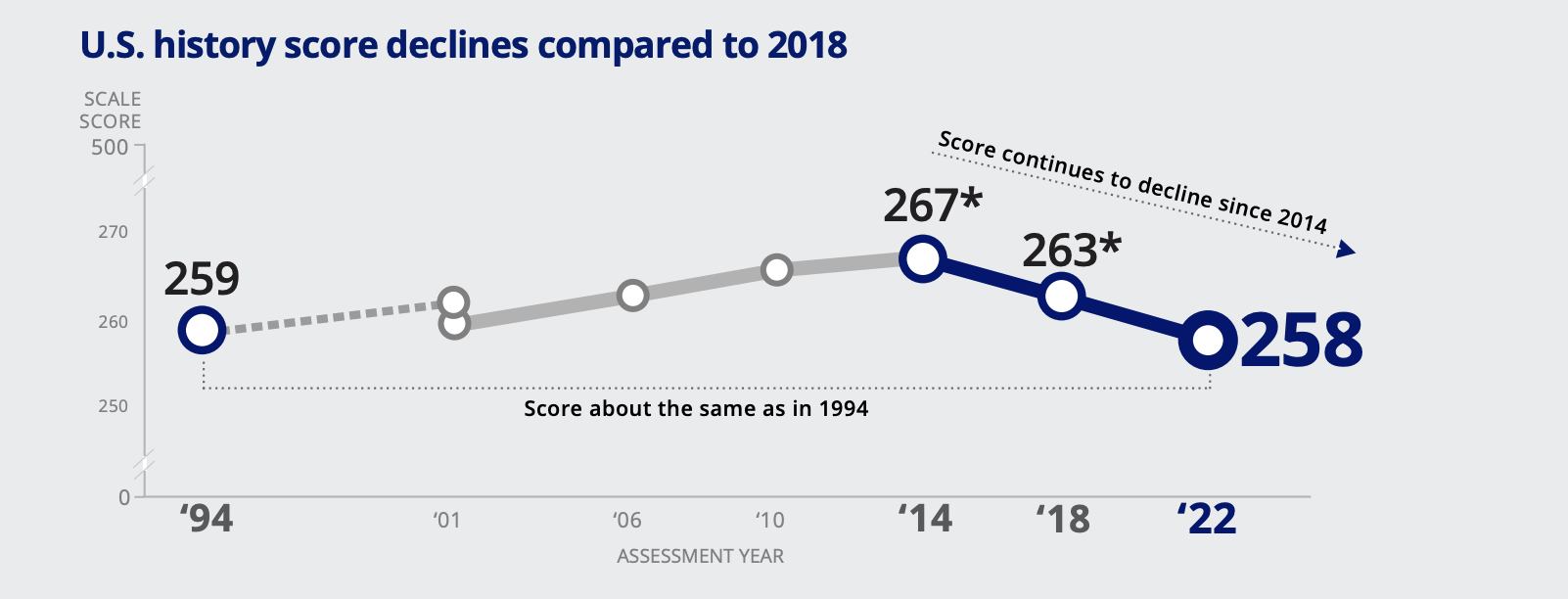Eighth-graders’ civics scores declined for the first time ever on the latest Nation’s Report Card while their performance on U.S. history assessments continued a near 10-year slide. Digging deeper, the losses were “widespread and pervasive,” said Commissioner Peggy G. Carr of the National Center for Education Statistics, which manages of the Nation’s Report Card.
Eighth-graders have dropped 2 points on the NAEP civics assessment, which measures students’ knowledge of American government and opportunities to participate in civic activities, the National Center for Education Statistics announced Wednesday in the release of the latest Nation’s Report Card results. The test is based on a 0-300 scale, and eighth-graders’ scores fell from 153 in 2018 to 150 in 2022.
In 2022, only 22% of eighth-graders scored at or above proficiency in civics by demonstrating an understanding of the purpose of government, the separation of powers and “how the ideals expressed in the nation’s core documents may differ from reality,” among other concepts, according to the National Center for Education Statistics.
More from DA: These are the best states for pre-K-12 education in 2023
This first-ever decline, in which the scores were not statistically significantly different from when the current version of the test was first conducted in 1998, raises alarms about students’ grasp of democratic principles and their chances of becoming “full participants in American democracy,” Carr said.
“Self-government depends on each generation of students leaving school with a complete understanding of the responsibilities and privileges of citizenship,” Carr said. “But far too many of our students are struggling to understand and explain the importance of civic participation, how American government functions, and the historical significance of events. These results are a national concern.”
U.S. history slumps along with civics
The 13% of eighth-graders who scored at or above proficiency in U.S. history represent the lowest proficiency level of any subject assessed by the NAEP. In fact, four in 10 eighth-graders performed below the basic level as scores declined in all four of the test’s major themes—democracy, culture, technology and world role—saw declines in scores.
Meanwhile, fewer students reported taking classes mainly focused on U.S. history. Some 68% percent of eighth-graders reported taking a U.S. history class in 2022, compared to 72% in 2018.

NAEP’s U.S. history assessment, which also uses a 300-point scale, “measures students’ knowledge and understanding of U.S. history in all its complexity—its major themes, periods, events, people, ideas, and turning points,” the organization says. The history scores—except for those of the very top-performing students—have been dropping since 2014.
Here are more key findings from the eighth-grade civics and history assessments:
Civics
- Scores declined for both lower-performing and middle-performing students between 2018 and 2022. Scores did not change significantly for higher-performing students.
- There was no significant change in the average score for students in any racial or ethnic group compared to 2018.
- 31% of eighth-graders performed below the NAEP basic level in civics in 2022, compared to 27% in 2018.
History
- Scores were five points lower compared to 2018 and not statistically significantly different from the average score in 1994, when the first U.S. history assessment was given.
- Scores declined for students at the 10th, 25th, 50th, and 75th percentiles between 2018 and 2022.
- Average scores for Black, Hispanic and white students declined from 2018 to 2022.
“Now is not the time for politicians to try to extract double-digit cuts to education funding, nor is it the time to limit what students learn in U.S. history and civics classes,” U.S. Secretary of Education Miguel Cardona said in a statement. “Banning history books and censoring educators from teaching these important subjects does our students a disservice and will move America in the wrong direction.”
This latest report follows the largest-ever drops in math scores for 4th- and 8th-graders recorded by the Nation’s Report Card last fall. Reading scores plummeted since the 2019 assessment, falling to levels not recorded since 1992.









